
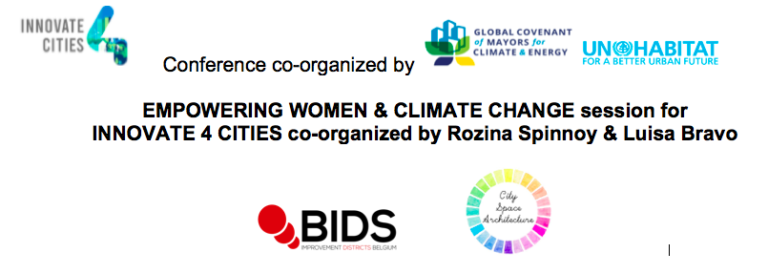
The conference was co-organized by the Global Covenant for Mayors for Climate Change and UN Habitat with sponsors of the IPCC.
This session was co-moderated by Rozina Spinnoy of BIDs Belgium and Luisa Bravo of City Space Architecture. With an inspiring all women line up of speakers from around the globe. The collaboration between BIDs Belgium and City Space Architecture to co-manage together the ‘Empowering Women’ session which also included the previous Empowering Women & Public Space project and subsequent collaborative ‘Talks’ sessions. The programme of Empowering Women will continue with our collaboration in various informative events and sessions with women and leaders from around the world.
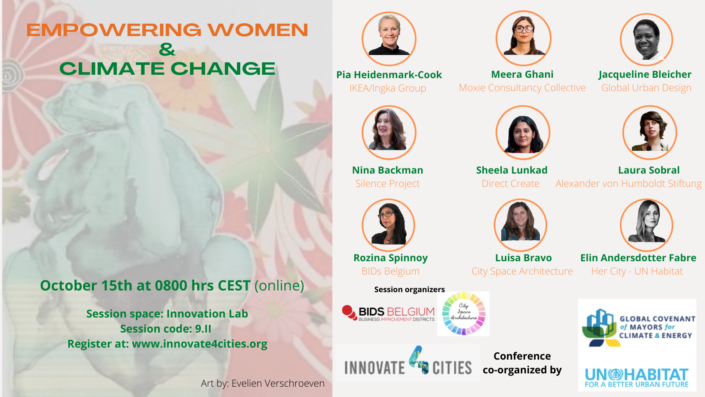
COP26, the UN Climate Conference taking place in November 2021 to be held in Glasgow. UN Women states: ‘With 67% of decision-making roles about climate worldwide, are occupied by men. Many of these are white. This is not okay. The people who suffer the effects of climate change worst, will be the world’s poorest and most marginalised.’ The UN is building a programme of events and demands from the world’s leaders during this conference (UN Women UK). Therefore, our topic of Empowering Women and Climate Change is indeed timely.
This session of Empowering Women and Climate Change recognizes the need for more gender equality, racial and social justice. With taking an integrated systemic and connected approach by local governments, private sector and grassroots and civil society organizations, together having a crucial opportunity to enhance their climate responses from social issues to the supply chain, from poverty alleviation and gender equality.
Overview:
As urbanization and urban settlements expand rapidly in all parts of the world, many cities face the challenge of becoming more resilient to climate impacts and tackling their rising emissions. Many cities and rural areas are therefore currently developing and implementing strategies and policies to address climate change and its impacts. Over recent times, projects are underway at a local to global level to tackle the gender inequities in the urban environment, from ‘Her City Tools’ to the initiatives of UN Women and linking to Climate Change.
We have over recent years, across the world, become aware of the increasing urbanization and the link to climate change. Although it has received more awareness than before, the link between women and climate change requires more dialogue and attention. Good governance and well-designed urban policies can help tackle the gender (social and racial inequalities) and climate change issues that are prevalent across urban (and rural) areas.
In order to achieve the Sustainable Development Goals by 2030, the participation and leadership of women in public life is essential. We know also that women are underrepresented in decision making at all levels in both public entities and the private sphere, via evidence of the data and statistics. There is much work to do in terms of Gender parity. There is much data to show that approximately worldwide there are less than 10% of female Mayors and 10% worldwide that are city councilors. There are further breakdowns showing the statistics of Women in executive government positions via UN Women.
In preparation for the event we also posed the below as a consideration to the Speakers.
‘How can diverse leaders and actors from different sectors, across policy-making, architecture and design; innovators and entrepreneurs; corporates and educators, urbanists and place-makers; further progress and tackle climate change?
To take action through utilizing education, tools and action together to integrate gender responsive climate policies at local, city and regional levels.
Whilst, empowering the intersectionality of women and girls with advancing racial equity and social equity across the globe. Can we place nature first with consideration to equality and equity for women and girls?’
Session details:
The full session is 90 minutes, divided in two sessions of 45 minutes each. Each session will host 4 and 3 speaker presentations of 7 minutes each, with a short discussion of approximately between 15-20 minutes.
First Panel of Speakers:
Second Panel of Speakers:
A brief rundown of the topic/presentations from each Speaker:
Key Takeaways from each Speaker (some of which is paraphrasing below):
Elin Andersdotter Fabre – Her City Manager and Global Space Programme at UN Habitat
An initiative by UN Habitat and various partners and collaboration from the Global South and Global North. Financed by a Swedish organization, with approximately 100 multi-stakeholders, from a range of sectors including research, civil society and citizens.
Custodians of SDG 11 Cities and other SDGs Gender Equality and Environmental Sustainability.
Her City initiative – HCT – Mission is to promote girls and young women’s participation in urban planning and design processes to create sustainable and inclusive cities. Social economical and environmentally across cities. The project fosters participation and inclusion in its processes. Concerning Climate Change – its a process to support urban actors and crowd source data to make right decisions and priorities within the urban process and guide through these processes.
Elin went on to show an image picturing Cities being crowded and polluted and with not a lot of women circulating, with a vision to change this. Cities house more than 55% global population and 70% of emissions and 70% of energy consumption and 1 billion living in informal settlements. Expected to increase in the coming decades.
Elin went through some data through the Gender gap data:
The initiative started in 2017 where it was mapping methods and tools globally that worked efficiently to work on inclusion and diversity and launching in 2019.
Independent project initiatives:
Users
Explaining Projects across the world in:
“Involving girls in urban development will make the city better for everyone. Girls plan and design with diversity and different needs in mind. Participatory processes are a key for planning a city that works for everyone. If we let citizens that are rarely heard” – Her City.
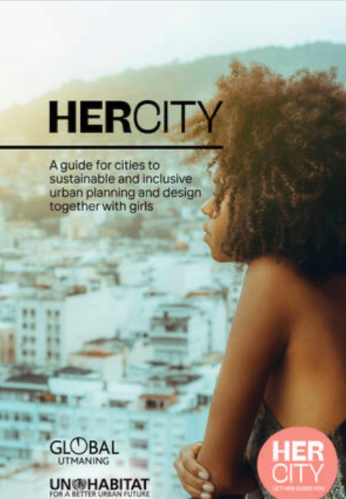
A focus on intersectionality, with refugees for example and the toolbox supporting urban development from a girl’s perspective, guiding urban actors and processes. Creating a cost efficient toolbox with digital guidelines separated into 9 blocks. With digital tools that includes checklist, minecraft, calendars and agendas, etc. Then assessment, design and implementation phase guidelines within the toolbox.
The platform is hercity.unhabitat.org for more information
Meera Ghani, Co-Founder, Moxie Consultancy Collective
Meera shared how she approaches the issues of Climate Justice and how it works with the intersection of other issues. “We will only be able to find Climate breakdown if our analysis correct to begin with.” Solutions are based on digital tools, she stated and they are not necessarily the only solution. Going on to mention that we need to also look at existing oppressions. Meera went on to state, “How this is a manifestation of capitalism, colonialism, patriarchy, able-ism and also somewhat of a white supremacy culture. Climate justice is about racial justice, disability justice, queer justice land justice, and energy justice, housing justice. Climate change manifests from these root causes.”
Taking an intersectional and integrated approach. Policy is one aspect she touches on, yet acknowledging that it’s about community activation and working grassroots. As Meera has worked in various communities in South Asia and it’s about the access and taking an intersectional approach. “It’s looking at how communities and people are impacted and know best their own challenges and solutions.” Yet knowing they may not have access to the decision makers. It’s about including children, refugees, disabled people, people of colour and this inclusion must be think carefully about the participation process and to understand how the consultation processes must be designed for this inclusion. “The solutions must be rooted in the needs of the people”.
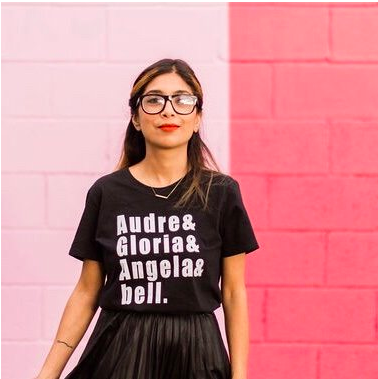
Looking at how and what policy makers must take into consideration, especially those in the EU. Using the vaccine strategy of the pandemic to share as an example of “how the Global South do not have access to the vaccines, despite being the most impacted.” The main message of looking at the interconnectedness of the challenges we face concerning climate justice and inclusion.
Pia Heidenmark Cook, Senior Advisor, IKEA/Ingka Group and Non-Executive Director
Pia shared the corporate perspective that is guided by the SDG’s within IKEA and they have a “people and planet positive and intersection of unsustainable consumption, climate change and inequality”. The strategy that was launched in 2012 and has a focus on the inter-connectedness of these areas. Also looking at the SDG’s and as being interdependent with each other.
The inequalities are more prominent more than ever before. Over the last 30 years and overall it’s not going in a good direction globally in this regard Pia states. Emphasizing that those with smaller means are most impacted. “The World Bank predicts that over 140 million people will be displaced by climate change by 2050. 76% of those displaced in 2016 were due to weather events.”
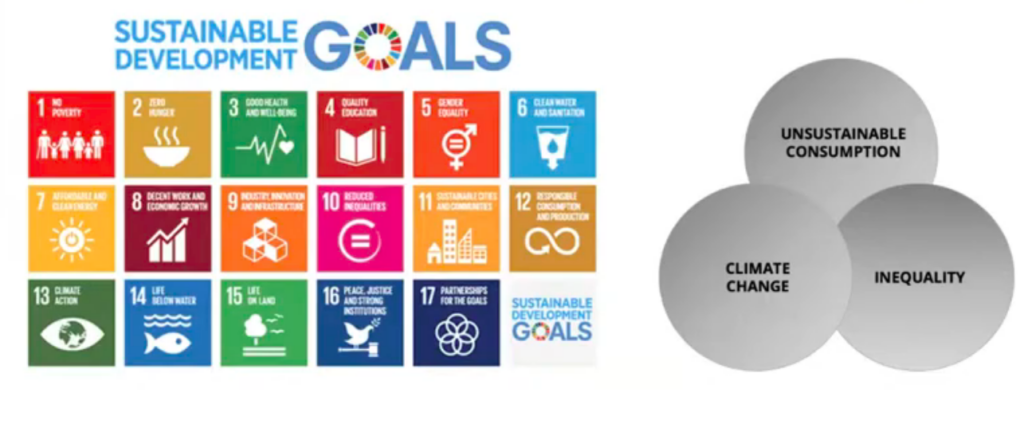
There is also an acknowledgement of the Global South and Global North, yet also stating that many Europeans also have several jobs. “Climate Change also is impacting displacement and as a result a lot of immigration” and hence refugees, Pia stated. “There is also an acknowledgement of the rising issues around mental health and the impact of climate anxiety amongst young people.”
With IKEA there is a vision of ‘Creating a better everyday life for the many’, which is via home furnishings and believing in ‘life at home’. “Founded 76 years ago with the ‘life at home’ approach, it was different than that of today”, Pia stated. Now this extends into community with the growing urbanism. Many aspects and dimensions around what life at home means. There is a focus on three aspects: Healthy & Sustainable Living – e; Circular & Climate Positive; Fair & Inclusive. There are 170,000 people working for the Ingka Group. The value chain overall involving around 2 to 3 million people. With a “customer base of around 2 billion people visiting IKEA throughout the world.” People are a key part of this. From healthy, sustainable living, with the IKEA range of solutions of ‘life at home’.
Women are a prime customer base of the organization. Hence IKEA also supports women through various social projects. Working towards being Climate positive – they have managed to keep growing and have reduced the CO2 emissions. There is much work being done also on the “fair and inclusive track with gender diversity at 50/50 with the employee base.” Equality also with pay and working with migrant community. Working with refugees and IKEA have committed to working with 2,500 refugees over the next 2 years. “Working with the extended community and working with language skills training and to create a better life for them and their families,” Pia states. Also working with many social entrepreneurs and many partners in social issues.
Also the charitable arm the IKEA Foundation donates 200 million a year and has pledged to donate and 1billioin euros over the next 4 years and that includes many projects in the Global South. There is a view on the need for an interconnected approach working with innovators, entrepreneurs and various actors in tackling the challenges together.
Jacqueline Bleicher, Founding Director, Global Urban Design CIC (GUD)
Sharing the work of her social enterprise, collaborating on community projects in amongst many other initiatives. Jacqueline spoke about the importance of Education and how it can raise awareness in key areas around the built environment and climate change. Policy, design, retrofitting and reuse, decommissioning and recycling.
Teaching a module on environmental management on the construction industry, she emphasized the need for policy change. Teaching her students that “Climate change is a global problem and how and what each country does creates impacts on other countries and it’s residents“. The construction industry plays a significant role in the CO2 emissions hence how cities are designed and planned is crucial. Also the interaction of natural environment and the various sectors from agriculture to transport and de-carbonization.
The approach from Jacqueline takes a “local and global view and the impact of climate change across different countries.” Teaching students about these development drivers and the pillars from the economic, social, environment drivers, whilst including the topic of gender ethnicity & socio-economic inequalities. Understanding the balance between the various pillars for sustainable development, as if they are not addressed, these can impact women and girls and they can be at the economic disadvantage due to climate change, she stated. Jacqueline presents the fact that a societal shift is required in order to achieve the green economy. Stating that “societal norms are dictated by institutions, businesses and as academics, placemakers and urbanists are placed well to be the connection and bridge the gaps between bottom up and top down.”

Pubic figures and youth activists share the common themes and they state more action is needed. More funding is needed, especially from the promised funding in the form of grants, for affected countries as approximately there is a promised 100 billion from wealthy nations, yet 50% of funding tends to go to the adaptation measures. Yet funding is not yet there and much more requires to be done. Jacqueline goes on to describe the process from a local urban design and participative project, looking at the needs of the community for the community itself.
The below Panel questions directed to each speaker after the first session:
The following panel questions were posed to the speakers of the first session:
Elin: How do you assess the use of Her City tools at grass roots level and do these tools consider sustainability aspects?
Pia: What more can corporates do to help women in leadership positions and the climate change movement across the world. How was it for you personally as a woman in a corporate environment passionate about sustainability?
Meera: What have been your experiences as a woman of colour working across the Eco landscape in Europe. How can the movements that exist help understand the challenges of women from the Global South in your opinion?
Jacqueline: How can we further progress the educational impact and awareness on matters of climate change on the built environment from design, construction and Policy makers, whilst giving space to the underrepresented voices of women.
Nina Backman, Artist & Founder, Silence Project
Nina presented her project the Silence project, which is an “interdisciplinary artistic project, which experiments with the concept of silence in relation to the new urban realities”. The practice, which was inspired by the Nordic nature and Finland. Conveying that all people should have access to the surrounding land and nature. The project symbolises for Nina, the very essence of the culture and heritage of the Nordics.
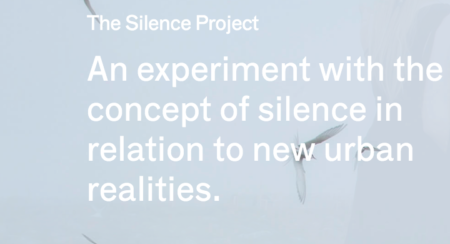
The projects started in 2013 and she mentions that as cities become more crowded and noisier, the silence is an important element. Nina went to explain another project, which is centered around ‘planting a million trees as both contemporary art practice and collective action to combat the climate crisis – thus uniting contemporary art making with climate activism’ This is more of a conceptual artistic project which planting a million trees is one part of. There is collaboration with local community cultural centres and museums, to locate free spaces to plant trees. Acknowledging the need for more bio-diversity with planting mini forests in another related project and “creating pocket’s of silence around the world, starting in Finland”. Going on to explain the details of how they implement the frames for the project around various areas, with collaborating with local communities. The projects have been bringing communities together and have been going well as she states. Also an important element of data gathering, with working with scientists to understand better the patterns and findings.
Sheela Lunkad, Founder, Direct Create
Sheela is a qualified Architect. She explained the challenges with urbanisation from a global perspective and also the local challenges, as she is based in Dehli. Touching on diversity and immigration. Explaining the need for “bringing life to rural areas across the world.” In India 80% of people work in agriculture and 50% of tha
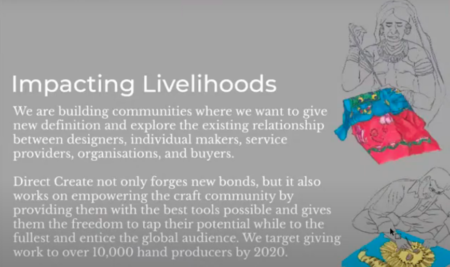
The digital platform that has been developed for Direct Create, links are made between different sectors to collaborate and co-create to the artisans. The platform can link everyone in order to connect and customize the 3,500 strong project communities that utilizes the digital platform. There are possibilities to do large-scale projects with the artisans to ‘direct create’ with the 9 simple steps on the platform. “Offering this service also enables a sustainable eco-system, bringing equitable livelihoods with cutting down wastage and working with sustainable materials linking to the circular economy. Building communities and connecting to the global markets, which directly impacts the livelihoods at a grassroots level,” Sheela stated. Providing services of business management, design collaborations right through to the production side. Working with more than 700 crafts on the platform. “Extending the community and collaboration to create positive impact, new innovative solutions and importantly social equity through the reach of the digital platform” of Direct Create. Growing the enterprise into Europe, with an office recently opening in Amsterdam.
Marcella Arruda, Urbanist and Project Director in the Instituto A Cidade Precisa de Voicê (The City Needs You Institute)
Marcella explains that ‘The City Needs You’ was created by the President Laura Sobral in 2015, (Laura was due to join us yet Marcella stepped in). The aim of the project is to work in public spaces and urban regeneration with community capacity building. Creating change in public space with 3 main approaches of: Urban Education; Hands on; Doing Together.

Also learning from grass roots and knowledge of the different actors of the community. Co-designing and co-building together with the community and maintaining the movements whilst creating co-governance structures. Marcella explained “There is a project called Eco Cidade, centred on regenerative agriculture and working with the food cycle, around the Northwest periphery of Sao Paolo.”Experimenting with social entrepreneurs and incubating ideas and programmes. Fostering ideas around healthy and sustainable food culture, with planting, cooking with local women and collectives from diverse backgrounds and migrants. With composting and looking at the delivery/logistics around the topic, whilst capacity building and energy solutions. Taking local contexts and sustainable management systems. Also developing digital exchange systems, of which the need became more apparent during the pandemic period. Work opportunities are also an aspect with looking at bike delivery collectives to generate income for diverse communities of people from different backgrounds. Urban regeneration and education is offered on the pedagogy aspect, with local actors and social entrepreneurs. To further educate on the tools and methods needed and supporting via a mobile activation trailer to bring directly to the communities. Educating on sustainability and with care to the overall community.
The following panel questions were posed to the speakers of the second session:
Nina: Your work as an artist is able to give more sensitive meanings to the concept of sustainability and nature-based solutions in urban environments, putting human beings at the core of the challenge for a better future. How do you think art and creative practices can be embedded in the collective actions aimed at finding solutions to climate change? Is it possible to develop awareness, education and empowerment through art?
Sheela: Your work is with the grass roots community and you help bring the traditional arts/crafts of India to the global audience, by connecting to a customer base of retailers and buyers. How far can your organization go in ensuring your work and values your business stands for (sustainability / circular economy aspect) – continues to be communicated throughout the supply chain of those you provide to?
Laura: Given your expertise on co-designing solutions through participatory practices able to combine top-down and bottom up approaches, what is the role of local communities in the global challenge of urban sustainability? How can local actions contribute to the global benefit?
Speaker and Moderator profiles from our session below.
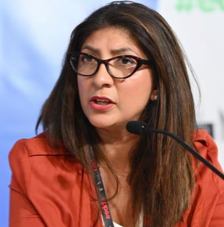
Rozina Spinnoy, Founder & Director – BIDs Belgium
Rozina Spinnoy is a Design Strategist and Social Entrepreneur. She has initiated social impact initiatives across a variety of sectors, around inclusive and sustainable communities. Projects range from Gender Issues, Mental Health and Place-making. BIDs Belgium is a community partner of the European Commission initiative of the New European Bauhaus.
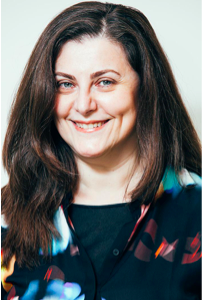
Luisa Bravo, Founder & President City Space Architecture
Luisa Bravo is a global academic scholar and educator, a social entrepreneur, and a passionate public space activist. She is the Founder, Editor in chief and Journal Manager of ‘The Journal of Public Space’, established by City Space Architecture in partnership with UN-Habitat, the United Nations Human Settlements Programme.
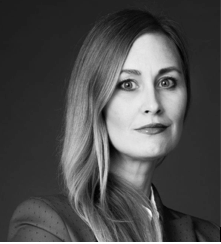
Elin Andersdotter Fabre – Her City Manager at UN-Habitat
Elin is managing the Her City Toolbox initiative at UN-Habitat’s (United Nations Human Settlements Programme) Global Public Space Programme. She previously worked as the Sustainable cities programme director at the Swedish independent think tank for Global Utmaning. She has been active in advocacy work for setting up the 2030 Agenda.
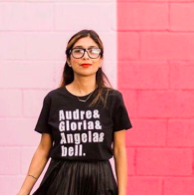
Meera Ghani Co-Founder – Moxie Consultancy Collective
Meera Ghani is the Co-Founder of the Moxie Consultancy Collective. She has worked with various NGOs on climate justice and human rights. Including CIDSE, WWF, Climate Action Network Europe. She advised the Government of Pakistan on climate policy and contributed to its delegation to the UN climate negotiations.
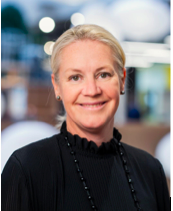
Pia Heidenmark Cook, Senior Advisor – IKEA / Ingka Group and Non-Executive Director
Pia Heidenmark Cook is a senior advisor to Ingka Group/IKEA, formerly the Chief Sustainability Officer (CSO) between 2017-2021. Currently a non-executive director in NGO and company boards across various business sectors, including retail, hospitality, food and materials innovation. Pia frequently lectures and speaks about sustainability and business transformation. (
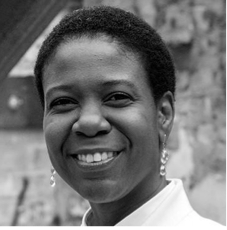
Jacqueline Bleicher, Founding Director of Global Urban Design CIC (GUD)
Jacqueline Bleicher is the Founding Director of Global Urban Design CIC (GUD), a Community Interest Company, specialising in Urban Design, Masterplanning, Transportation planning and engagement. She is an Urban Designer, Masterplanner, Placemaker, Workshop Facilitator, Speaker, Mentor, Registered, Chartered Architect and Associate Lecturer.
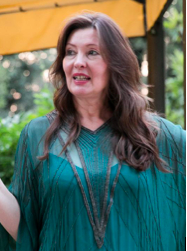
Nina Backman, Artist & Founder – The Silence Project
Nina Backman is a Finnish artist, performer, curator, and founder of the Silence Project. She was born in Helsinki, Finland, and originally studied Performance Design at the Liverpool Institute for the Performing Arts in the UK. She exhibits internationally and her work can be found in private and public collections.
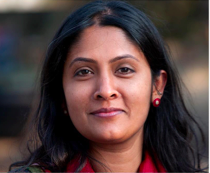
Sheela Lunkad, Founder – Direct Create
Sheela has more than two decades of experience in the areas of Design and sustainable practices, in arenas ranging from craft revival, textiles, product design, Architectural and spatial design and sustainable eco tourism in Hospitality. Sheela is also Director of Chestnut Heights Resorts PVT Ltd and Vistaap Infra projects PVR Ltd.
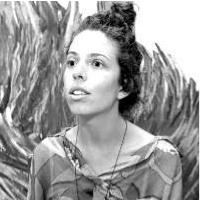
Marcella Arruda, Urbanist and Project Director in the Instituto A Cidade Precisa de Voicê (The City Needs You Institute),
CSO that aims to improve public spaces through collective social actions. There, she is the co-ordinator of the project Ecocidade, building social networks for community resilience and fighting climate collapse.
BIDs Belgium and City Space Architecture thank Innovate4Cities and all the partners for this important session of Empowering Women and Climate Change.
We will be following up with further sessions soon on the topic of Empowering Women.
Thank you for reading and watching our session.
Feel free to reach out to us:
Rozina Spinnoy – rsp@bids-belgium.com
Luisa Bravo – luisa.bravo@cityspacearchitecture.org
Please contact us if you wish to know about Empowering Women Public Space & Climate Change or just want to say Hello!